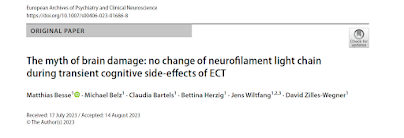No Change in Neurofilament Light Chain After ECT: Debunking the "Brain Damage" Myth
Out on PubMed, from investigators in Germany, is this study:
The myth of brain damage: no change of neurofilament light chain during transient cognitive side-effects of ECT.
Eur Arch Psychiatry Clin Neurosci. 2023 Sep 1. doi: 10.1007/s00406-023-01686-8. Online ahead of print.PMID: 37656172
The abstract is copied below:
Electroconvulsive therapy (ECT) is an effective, safe, and mostly well-tolerated treatment for patients with severe or difficult to treat depression or psychotic disorders. However, a relevant number of patients experience subjective and/or objective cognitive side-effects. The mechanism of these transient deficits is not yet clear. Thus, our study prospectively investigated neurofilament light chain (NfL) concentrations as a highly sensitive biomarker for neuroaxonal damage along with cognitive performance during a course of ECT. Serum NfL concentrations from 15 patients with major depressive disorder receiving ECT were analyzed (1) 24 h before the first ECT, (2) 24 h and (3) 7 days after the last ECT (45 measurements in total). Neuropsychological testing including memory, executive functions and attention was performed at each time-point. NfL concentrations did not change between the three time-points, while a temporary cognitive impairment was found. Even in the subset of patients with the strongest impairment, NfL concentrations remained unchanged. Neuropsychological testing revealed the common pattern of transient cognitive side-effects with reduced performance 24 h post-ECT (global cognition score: p < 0.001; memory: p = 0.043; executive functions: p = 0.002) and return to baseline after 7 days (all p < 0.001). Our study adds to the evidence that neither ECT per se nor the transient cognitive side-effects seem to be associated with an increase of NfL as a marker of neuroaxonal damage. In contrast, we discuss cognitive side effects to be potentially interpreted as a byproduct of ECT's neuroplastic effects.
Keywords: Biomarkers; Brain damage; Cognition; Electroconvulsive therapy (ECT); Neurofilament light chain (NfL); Neuropsychology.
The article is here.
And from the text:
Here is a really excellent study, clearly and thoughtfully presented. It provides excellent evidence to counter the false claims that ECT causes "brain damage" or that transient cognitive impairment may be conflated with some type of "brain damage."
I recommend a full read (~15 minutes) to all ECT practitioners and health care personnel involved with any aspect of ECT.
Kudos to our German colleagues for this extremely helpful contribution to the ECT literature.







Comments
Post a Comment